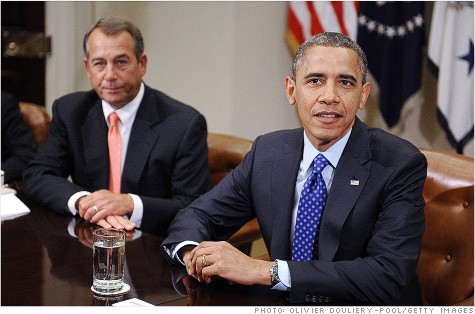
President Obama and Majority Leader John Boehner have to deal with sequestration as part of their fiscal cliff talks.
NEW YORK (CNNMoney) -- There's one part of the fiscal cliff that nearly everyone agrees on: avoiding the $1.2 trillion in automatic spending cuts scheduled to begin on Jan 2.
Nearly lost in the heated discussions over tax cuts and entitlement reform is so-called sequestration. Part of the Budget Control Act of 2011, the cuts are set to automatically take effect in 2013 if an alternative agreement is not reached.
The reductions, which will take place over a decade and are spread equally between defense and non-defense federal spending, were designed to be unpalatable to both parties.
The Office of Management and Budget released calculations in September showing there would be a 9.4% cut to discretionary defense spending, such as overseas operations and weapon systems.
Non-defense discretionary spending, which includes housing assistance and energy subsidies for low-income people, would drop by 8.2%.
And non-defense mandatory spending, including the U.S. Forest Service and social services block grants, would be cut 7.6%. Certain low-income programs, such as Medicaid and food stamps, are shielded.
If these cuts are enacted, it would hurt the economy, experts say. In fiscal 2013 alone, federal spending would fall an estimated $65 billion, according to the Congressional Budget Office. This could shave off two-thirds of the expected economic growth for the year and boost the unemployment rate by as much as 1.5 percentage points, according to Steve Fuller, director of the Center for Regional Analysis at George Mason University.
"I hear it's too stupid to allow to happen, but they [lawmakers] don't talk about how to resolve it," said Fuller.
Related: Time running out on debt ceiling
Because of the uncertainty surrounding the cuts, experts say it's unclear what will happen come Jan. 2. Some budget watchers say federal agencies may hold off enacting the cuts to give Congress time to agree on an alternate deficit reduction plan. But advocates are warning that the cuts could devastate education and housing assistance.
Some 18% of federal grant money that flows to states would be subject to cuts, said Anne Stauffer, project director at the Pew Center on the States, which recently issued a report on the impact of sequestration. The cuts could total $7.5 billion. Title 1 spending for low-income students and special education funding would be the hardest hit. And more than 200,000 children could be dropped from the Head Start program.
Most states, meanwhile, are closely monitoring events in Washington, but Virginia is one of the few who is taking action now. The governor there has asked all state agencies to submit plans outlining how they would reduce spending in their departments by 4%.
"At this time we are simply preparing for this possible, but still avoidable, outcome," he said in mid-November.
On the defense side, many federal contractors are already holding off on hiring and projects, waiting to see what Congress does, Fuller said. The spending reductions could cost 325,700 jobs, including 48,100 civilian Department of Defense employees. Suppliers and vendors that depend on military contractors could also shed 282,400 jobs.
"Neither Democrats nor Republicans think sequestration is a good idea," said Michael Linden, director for tax and budget policy at the Center for American Progress, a left-leaning group. "That bodes well for their doing something about it." ![]()
First Published: November 29, 2012: 5:26 AM ET
Anda sedang membaca artikel tentang
Fiscal cliff countdown: Automatic spending cuts
Dengan url
http://ngopingeteh.blogspot.com/2012/11/fiscal-cliff-countdown-automatic.html
Anda boleh menyebar luaskannya atau mengcopy paste-nya
Fiscal cliff countdown: Automatic spending cuts
namun jangan lupa untuk meletakkan link
Fiscal cliff countdown: Automatic spending cuts
sebagai sumbernya
0 komentar:
Posting Komentar